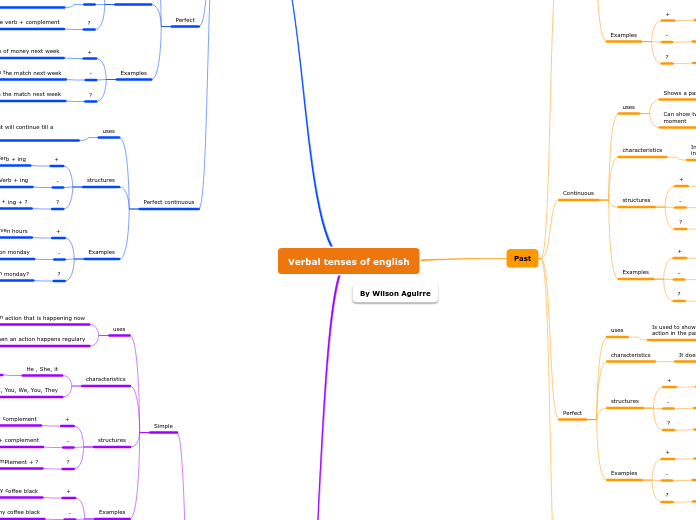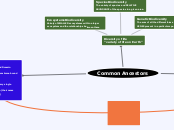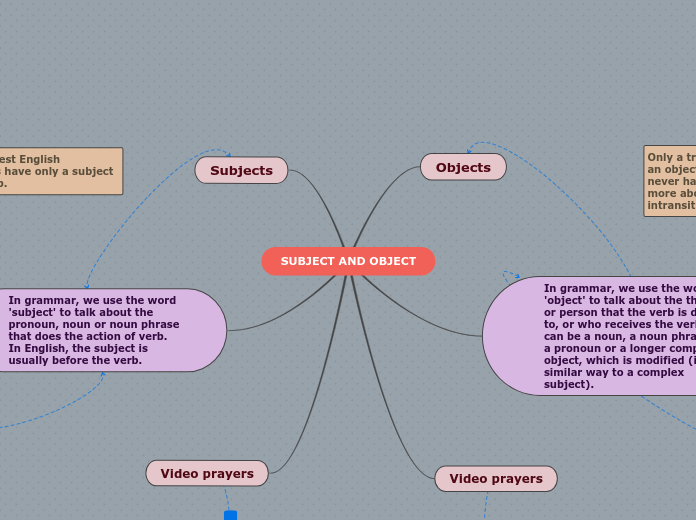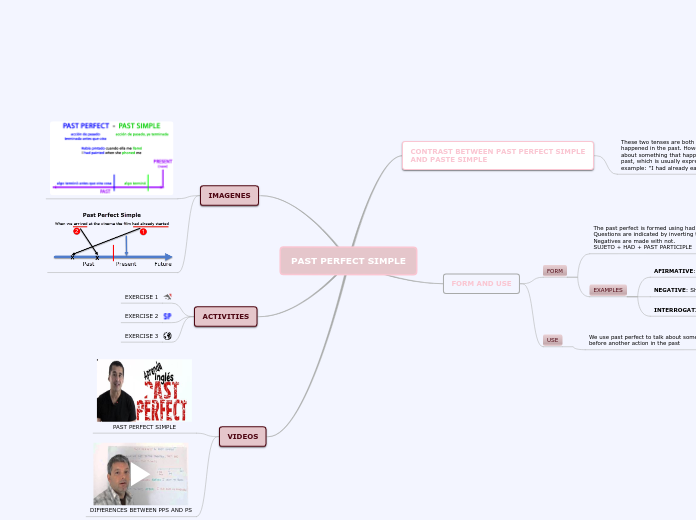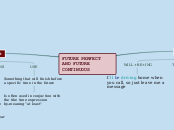By Wilson Aguirre
Verbal tenses of english
What is your business proposal about?
Give it a name. Type it in.
Present
What other options could solve the problem? Add an alternative.
Related information about the options that have been identified might be needed.
Add resource(s)
Has she been listening music?
She hasn´t been listening music
She has been listening music
Structure
Have / has + subject + been + Verb + ing + ?
Subject + have / has + not + been + Verb + ing
Subject + have / has + been + Verb + ing
Is used to let us about an accion that started in the past till now
Summarize your alternative points.
Add a conclusion
Have I cleaned my room?
I haven't cleaned my room
I have cleaned my room
Have / has + Subject + past participle verb + complement
Subject + have / has + not + past participle verb + complement
Subject + have / has + past participle verb + complement
It can be used to talk about experiences
Is used to show an action that happened in the past but it continues today
Disadvantages must be accurately stated from your client's point of view.
Add a disadvantage
Is she listening the music now?
She isn´t listening the music now
She is listening the music now
be + subject + verb + ing + complement+?
subject + be + not + + verb + ing + complement
subject + be + verb + ing + complement
Can describe two actions that are happening now
Advantages must be accurately stated from your client's point of view.
Add an advantage
Do you prefer your coffee black?
I dont't prefer my coffee black
I prefer my coffee black
Do / Does + subject + verb + complement + ?
subject + Do / Does + verb + not + complement
subject + verb (Infinitive ending or "s") + complement
I, You, We, You, They
Infinitive verb
He , She, it
Ending (s)
Is used when an action happens regulary
Can let us about an action that is happening now
Future
Include any detailed data in appendices rather than break up the flow of the proposal.
Identify the contents of an appendix for your proposal.
Will you have been working on monday?
I won't have been working on monday
I will have been working for seven hours
Will + subject + Have been + Verb + ing + ?
Subject + will + not + have been + Verb + ing
Subject + Will + Have been + Verb + ing
Is used to let us about an accion that will continue till a particular time
Will We have won the match next week
We wont have won the match next week
we‘ll have earned lots of money next week
Will + Subject + have + past participle verb + complement
Subject + will + not + have + past participle verb + complement
Subject +will + have + past participle verb + complement
Is used to show an action that will be finished till other future event
Will you be waiting for me?
I won’t be waiting for you
I will be waiting for you
Will + subject + be + verb + ing + complement+?
subject + will + not + be + verb + ing + complement
subject + will + be + verb + ing + complement
is used for different purposes
Can describe an unfinidhed action in progess at a time later than now
Add an appendix.
Will he play basketball?
He won't play basketball
He will play basketball
Will + subject + verb + complement + ?
subject + will + not + verb + complement
subject + will + verb + complement
Can let us about an action that havent happened yet
Past
Perfect continuous
Had Laura been trying repair the hoodie yesterday?
Laura hadn't been trying to repair the hoodie yesterday
Laura had been trying to repair the hoodie yesterday
Had + subject + been + Verb + ing + ?
Subject + had + not + been + Verb + ing
Subject + had + been + Verb + ing
Is used to let us about an accion that started in the past till another started
Perfect
Had Carlos gone out when i called him?
Carlos hadn't gone out when I called him
Carlos had gone out when I called him
Had + Subject + past participle verb + complement
Subject + had + not + past participle verb + complement
Subject + had + past participle verb + complement
It doesent matter which event is mentioned first
Identify an opportunity that requires action to be taken, which your solution will address. Add an opportunity.
Is used to show an action that happened bebore another action in the past
Add any supporting information or evidence of changes. Type it in.
Continuous
Was Felipe watching TV last nigh?
Felipe wasn't watching TV last nigh
Felipe was watching TV last nigh
was / were + subject + verb + ing + complement+?
subject + wasn't / weren't + verb + ing + complement
subject + was / were + verb + ing + complement
In these sentences often the personal pronouns are shortened into a contraction
I'm, you're, he's, she's, it's, we're, they're
Identify a problem that requires action to be taken, which your solution will address. Add a problem.
Can show two actions that were happening at a specific moment
Shows a past action that was happening at a specific moment
Simple
Examples
Did tomas play soccer yesterday?
Tomas didn't play soccer yesteday
Tomas played soccer yesterday
structures
?
Did + subject + verb + complement + ?
-
subject + didn´t + verb + complement
+
subject + verb + ed + complement
characteristics
Ending
Regular verbs
Ending (ed)
Irregular verbs
Different endings
uses
Identify a change or a trend in the current situation, that requires action to be taken. Add a change.
Can let us about an action that already finished
Can let us about something that already happened
Add any supporting information or evidence of changes.
